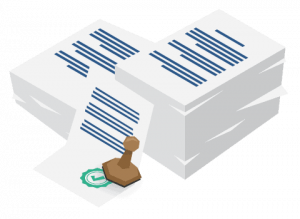BOI FAQs: Answers for Reporting LLCs and More
Below, you’ll find answers to frequently asked questions about the Beneficial Ownership Information (BOI) Report. The BOI Report is a new federal filing required by the Corporate Transparency Act (CTA) and includes information about your business that will be stored in a federal database.
We’ll cover:
Glossary of CTA Terms
Below are some common phrases used when discussing the CTA and BOI reporting requirements.
- The Corporate Transparency Act (CTA): the legislation that passed BOI requirements
- Beneficial Ownership Information (BOI): details about the people who own and influence a company
- Beneficial Owner: someone who has majority control over your business (could mean financial control over 25% or even just influence)
- The Financial Crimes Enforcement Office (FinCEN): the governmental body in charge of investigating and enforcing financial crimes like money laundering
- Beneficial Ownership Secure System (BOSS): FinCEN’s online database where BOI Reports are stored
- Reporting Company: any company that is required to submit a BOI Report
- Company Applicant: the person who submitted your formation paperwork with the state (does not need to be the listed organizer or incorporator)
These terms will come up again and again—especially when you’re filing the BOI Report yourself. You can come back here for a refresher. Plus, we’ll update this if new lingo is put out about the CTA or BOI Reports.
BOI Frequently Asked Questions
Whether it’s the first time you’ve heard of beneficial ownership information or the tenth, you’ve probably still got questions.
BOI requirements have already changed a few times, and there are a few things that are still being worked out at the governmental level—that’s why we’re keeping track of the still-evolving rules and requirements for you.
What is the BOI Report?
The BOI Report is a mandatory federal filing that LLCs and corporations operating in the U.S can submit to the government.
Is the BOI Report a new law?
Kind of—the BOI Report is a new requirement that comes from the CTA, which is a new law. It’s not technically its own law.
Why does the BOI Report exist?
The BOI Report is meant to illuminate who is running companies across the U.S. in order to reduce illegal activities run through shell companies.
Congress has passed this new requirement as part of the CTA, tasking FinCEN with gathering and storing BOI Reports. FinCEN will then be able to use this information to investigate financial crimes, like money laundering, terrorism, trafficking, and more.
What goes into the BOI Report?
If you choose to file your BOI Report, you will need to include information about the company and its beneficial owners. If you formed your business on or after January 1, 2024, you’ll also need to include information about your company applicant(s).
Business information:
- Legal name
- Any DBAs/trade names
- Permanent address
- State or jurisdiction where you formed your business
- Unique identifying number
Beneficial owner and company applicant information:
- Full legal name
- Permanent residential/business address (no PO boxes allowed)
- Date of birth
- Unique identifying number from a passport or state ID
Alternatively, you and/or your business could get a FinCEN Identifier Number. You can provide that number to FinCEN instead on your report(s).
What does Beneficial Owner mean?
A beneficial owner is anyone at your company who has substantial control. This includes anyone who has at least a 25% financial hold over the business, as well as anyone directly in charge of decision-making. In general, the CTA is loose with this definition, so it’s important to really consider: who is influencing decisions within your company? These people are likely to be beneficial owners.
Who counts as a company applicant?
At most, a reporting company will have two company applicants: the individual who submitted the formation filing to the state and the individual that directed the filing. For example, if you are the owner of a company and filed your own formation documents, you would be the only company applicant. If you are the owner of a company and provided formation details to an employee that drafted and submitted the formation document to the state, both you and your employee would be company applicants.
Where things get a little confusing is when third parties are brought into the mix. For example, if you hired an attorney to form the entity, you and that attorney are likely both company applicants. However, if that attorney directed their paralegal to do the drafting and submission, then the attorney and paralegal are likely the two company applicants.
Basically, if you are making decisions about what is in the formation paperwork, how and when it is being filed, or instructing someone else to make these decisions, you are likely a company applicant. To keep up to date on who is considered a company applicant, visit FinCEN’s FAQ page.
What types of businesses qualify as reporting companies?
Essentially, any corporate entity doing business in the US that doesn’t qualify for a BOI reporting exemption. This includes domestic LLCs, corporations, and trusts, as well as international entities that do business in the United States. As a rule of thumb, if your entity had to file formation documents with a state agency before doing business, then your entity is a reporting company.
What does it cost to file a BOI Report?
It currently costs $0 to file your BOI Report.
Does the BOI Report have to be updated?
Yes. Unlike an annual report, you only have to file the BOI Report once—but you do have to submit changes. If the information submitted (like your reporting company’s main address or who your beneficial owner is) changes, you have 30 days from that change to update your BOI Report.
Where does the BOI Report go?
Reports are filed on FinCEN’s E-filing system. They are stored internally on a private database called BOSS.
Is a Beneficial Owner listed on public record?
No, your beneficial ownership information won’t be publicly available and won’t be subject to Freedom of Information Act requests. However, your report will be available by request in order to further along the goals of the CTA (aka, fighting financial crimes). This means that federal law enforcement agencies, state/local law enforcement with a court order, and federal agencies on behalf of a foreign country with international agreement are all allowed access to the reports. Additionally, financial institutions can request your information but only with your permission.
What is a FinCEN Identifier Number?
A FinCEN Identifier is a unique identifying number assigned to individuals and companies. This number can be used on your BOI Report instead of your personal information.
Just keep in mind that in order to get the FinCEN Identifier, you’ll still have to submit your information to FinCEN—the main benefit is not to avoid submitting information, but to avoid the need to give someone in your reporting company itself that information.
How do you get a FinCEN ID?
You submit your personal information (legal name, date of birth, address, and a unique I.D. number) to FinCEN. They’ll then give you a unique number that can be used instead of this information in your BOI Report. (This is particularly helpful if you have multiple reporting companies and you are not the primary filer.)
What reporting companies are exempt from filing a BOI Report?
There are currently twenty-three different types of businesses that qualify for BOI exemption. These include banks, public utilities, inactive entities, tax-exempt entities, and large operating companies.
Which people are exempt from filing their information on their BOI Report?
Most beneficial owners must file their information, but there are a few exceptions. These include:
- a minor child (parent/guardian information must be reported)
- anyone who is a nominee, intermediary, custodian, or agent on behalf of another individual
- an employee of a reporting company
- anyone whose only interest in a reporting company is a future interest through a right of inheritance
- a creditor of a reporting company
What is the purpose of BOI Exemptions?
Remember, the BOI Report is part of a federal effort to curb financial crimes like terrorism. In situations where Congress and FinCEN think it’s unlikely crime will occur, like when a nonprofit already has to report their information to other governmental agencies or when the person with substantial financial control is a minor, there are fewer or no BOI reporting requirements.
What’s happening with the Beneficial Owner Report filing requirements?
Enforcement of the Beneficial Ownership Information Report requirement was paused due to a Texas Federal Court injunction early in December 2024. As of February 19, 2025, the BOI Report is once again mandatory for nonexempt reporting companies to file that do not qualify for an extension on their deadline.
The BOI Report requirement is currently under review by both FinCEN and Congress, but the deadline for existing businesses to file the BOI Report is March 21, 2025. New business have 30 days from their formation date to file their Reports. We’ll keep our pages up to date as court rulings play out, so you’re not left out of the know about this important business filing.
Can I still file my Beneficial Owner Report?
Yes, you can still file your Beneficial Owner Report. If you’ve already hired us to handle this, we’re continuing to file for our clients, even though the process is slower due to limitations FINCEN has placed on submission methods.
Should I file my Beneficial Owner Report myself?
If you prefer to file on your own, you’re welcome to do so. However, if you’ve already hired us, rest assured that we’re actively working on your filing and will handle it as soon as possible.
Is this connected to the New York LLC Act?
BOI requirements are only tangentially connected to the New York LLC Act. The New York LLC Act requires beneficial owners of New York State LLCs to report their personal information to the state. This is based off of the CTA, but it is not technically connected to it—and importantly, filing one does not get you out of filing the other.
What is the Corporate Transparency Act?
The CTA comes from the Anti-Money Laundering Act (AMLA) which in turn came from the National Defense Authorization Act (NDAA). It was pushed through by Congress in January 2021.
The AMLA’s goal is to bolster whistle blower protections, increase oversight on “rising channels” where crime takes place, and expand legal information sharing with foreign parties. In other words, it hopes to make it harder to commit financial crimes and easier to figure out who is committing them.
Inside the AMLA is the CTA. Congress says the BOI Reports will help aid the overarching AMLA goals, by making it easier to spot shady business practices through gathering private information on reporting companies and the people who run them.
Can someone else file a BOI report on my behalf?
Yes. You can have someone at your company file your report on your behalf or hire an outside service, like Northwest!
Why hire Northwest?
Northwest’s BOI Reporting Service is an easy and secure way to file your BOI Report without the hassle of doing it yourself. When you hire us, you get our team of experts to file your information and answer any questions you might have. We can form your company at the same time, which lets you put all the beurocracy of starting a business on us while you focus on better things. The best part? It’s only $25 to have us file your BOI Report for you.
*This is informational commentary, not advice. This information is intended strictly for informational purposes and does not constitute legal advice or a substitute for legal counsel. This information is not intended to create, nor does your receipt, viewing, or use of it constitute, an attorney-client relationship. More information is available in our Terms of Service.






